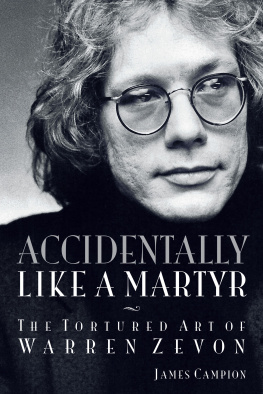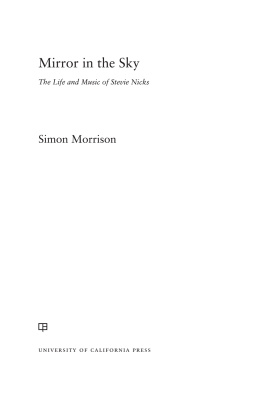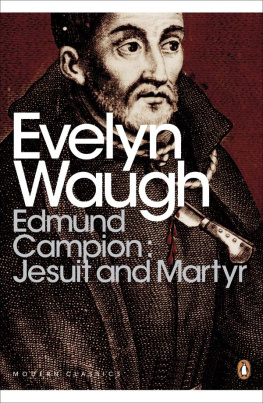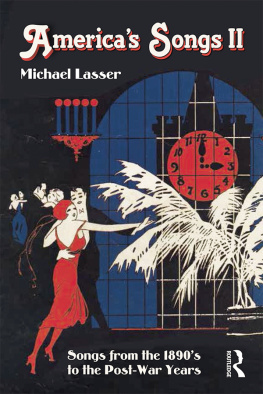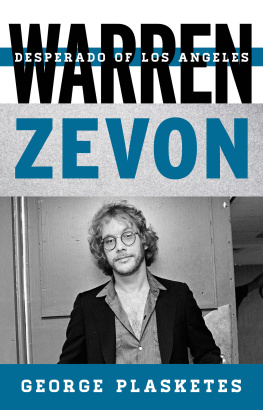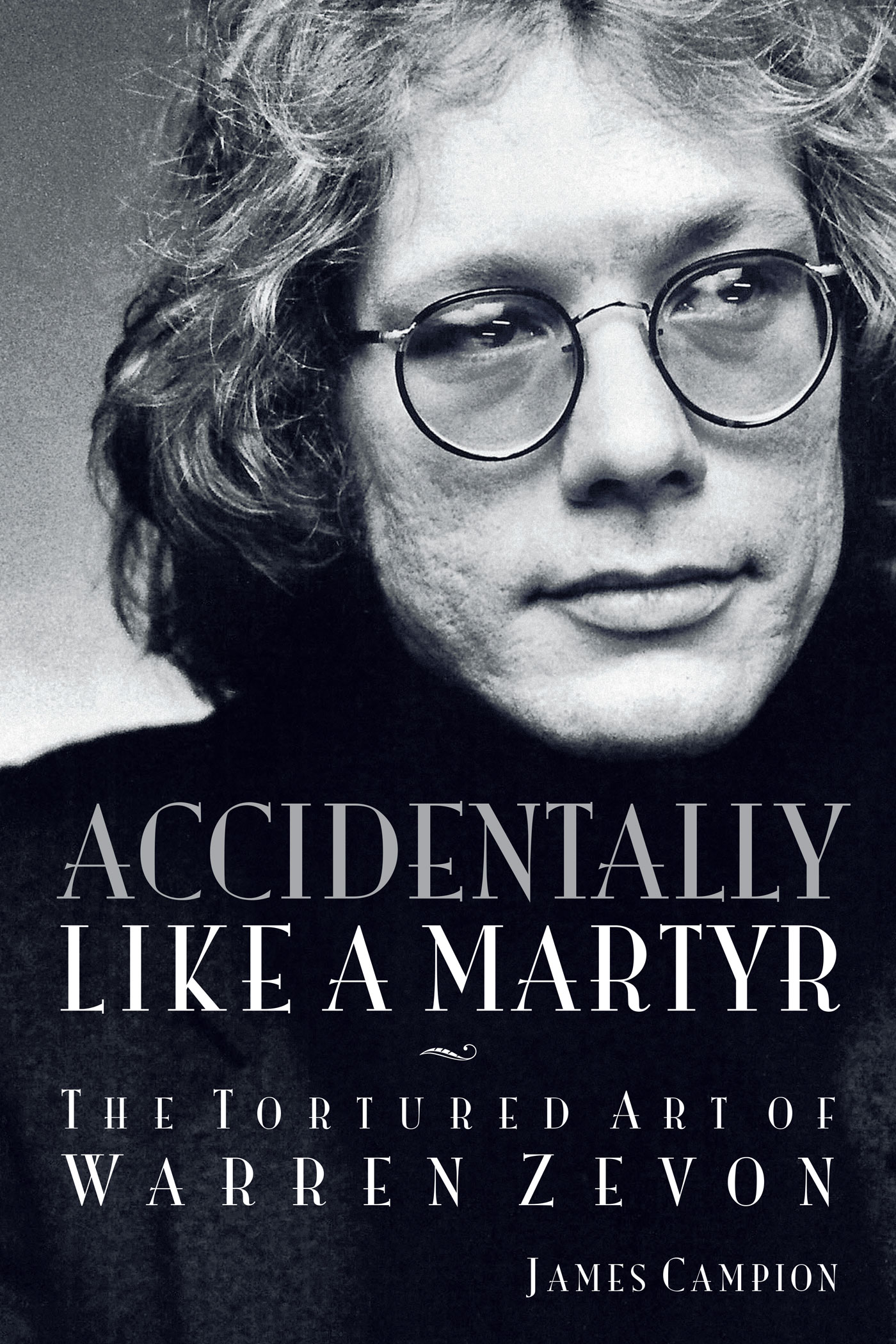All rights reserved. No part of this book may be reproduced in any form, without written permission, except by a newspaper or magazine reviewer who wishes to quote brief passages in connection with a review.
Every reasonable effort has been made to contact copyright holders and secure permissions. Omissions can be remedied in future editions.
Acknowledgment of permission to reprint lyrics is on pages 267270, which constitute an extension of this copyright page.
Names: Campion, James, 1962- author.
Campion.
Description: Montclair, NJ : Backbeat Books, 2018. | Includes bibliographical
references and index.
Subjects: LCSH: Zevon, Warren. | Rock musicians--United States--Biography.

The Restless and Literate Troubadour:
Joel Bernstein, 1977. All Rights Reserved. (joelbernstein.com)
Introduction
Hell lies at the bottom of the human heart,
and you find it by expressing your personality.
Ross Macdonald
I think of Warren Zevon songs as chapters in the great American novel. Its story lies at the heart of his and our psyche. The lines are blurred. We never seem to know if were looking in a mirror or peering through a window; we only know that when we listen, we see something. The music, a plaintive mixture of balladry and raunch, sets the scenehis voice a striking baritone, our guide through a labyrinth of harrowing narratives. The plot unfolds without subtlety; each lyrical arc awakens imagination. The songs are confessionalsunrepentantly rawas well as testimonials to the entangled tragicomedy of the human experience. They speak of extremes, revel in contradiction, and parry with irony, taking random and often comedic stabs at calamity while seducing conflict. These are the sounds of both dread and hope, and very often they arrive at once.
In the songwriting field, there isnt a section for fiction and a section for nonfiction; theyre all mixed together, Zevon once mused to Jody Denberg of Austins KGSR. And perhaps no songwriter balanced this more effectively. Zevons friend and producer, Jackson Browne, told David Fricke of Rolling Stone , He fully volunteered to undergo whatever trial by fire was necessary to get at the truth. Danny Goldberg, whose Artemis Records was the final spin on Zevons record label roulette wheel, described it to me as a psychological truth no one else could quite identify.
There is a special corner of our tickled soul that gets Warren Zevon that is not available to other artists. For nearly three decades, Zevon managed to fit a great deal into that corner. Until now, I am not sure anyone has dared divulge its contents.
I now humbly take on the challenge.
Welcome to the Zevon Corner.
It comes with a warning: No one emerges unscathed. The darkness must be embraced so that the light can be better appreciated, as street poet laureate Charles Bukowski once imagined. And, as in Bukowski, the characters found between the light and dark, no matter how bizarre and disturbing, appear eerily familiar.
Zevons creative alchemy can transform perspective with a single verse. His son, Jordan, expressed to me one day: I can only speak through my bloodline experience, but theres a dramatic duality in my fathers songs: The world is really fucked up, but look at that lily growing out of a crack in the sidewalk.
Zevon exploited touchstones in provocative literature and film and blended them with his everyday experience to achieve what eighteenth-century French novelist Victor Hugo describes in Maurice Shroders Icarus: The Image of the Artist in French Romanticism as [the transformation of] the banality of the human experience to a heightened level of knowledge about our existence through self-expression. Hugo expounds, Every man who writes, writes a book; this book is himself. Whether he knows it or not, whether he wishes it or not, it is true. From every body of work, whatever it may be, wretched or illustrious, there emerges a persona, that of the writer. It is his punishment, if he is petty; it is his reward, if he is great.
Zevons ex-wife, Crystal Zevon, left me with this nugget: If youre looking at the themes through his songs and what influenced them, at the heart of everything is that Warren was an artist... first.
The music of Warren Zevon resonates today because he visited the places we fear to tread and returned with some of the most challenging, engaging, beautifully disturbing songs known to the craft, while never ignoring humor. In Kurt Vonneguts Slapstick every chapter ends with I had to laugh, which is sort of an attitude I subscribe to, he shared with Rob Patterson of Creem magazine the month Werewolves of London, his biggest and most memorable song, hit the charts. And we chuckled along with him, because if there is one thing lovers of Warren Zevons music can attest to, its that we are hooked. There are hardly any casual Zevon fans. We are lifers. I know, for I am one.
So is Taylor Goldsmith, front man and songwriter for the folk-rock band Dawes, who has chosen to cover several Zevon songs and basks in their fusing of humorous profundity. Warren had his antenna up on the evocative and ridiculous, exclaimed Goldsmith when I first asked him about Zevon. Not only does he give you something that would never occur to you, he follows through into something worthwhile that can speak to all sorts of aspects of our strange contemporary lives in a way that songwriters struggle with getting to because theyre all so... damn... serious.
His mind was busy exploding out of his head when he was writing, another charter member of the Zevon Corner, Adam Duritz, front man and songwriter for Counting Crows, told me when I was finishing this book. It wasnt enough to just write characters into his songs: They had to be larger than life and not fit for proper society; werewolves and gorillas, which are both funny and scary, like him. Their appetites are massive, like his. The scope of his work, the sweeping, almost cartoonish character portrayals against the intimate love songs forced you to look at all of it.
Master guitarist and Zevons onetime bandleader David Landau concurred when I pressed him about the unique quality of Zevons work. Warren Zevon had a voice . Maybe you understand it, maybe you dont, but theres no other voice like that voice. To his credit, and a testimony to the fact that he really was an artist, he kept putting that voice out there regardless of whether anyone was listening or not.

